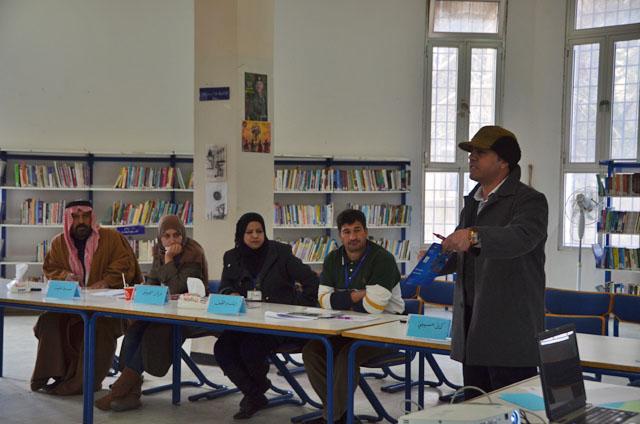AMMAN/MAFRAQ — Syrian refugee Hussein Jneidi usually did not pay attention to the risks posed by mines or explosive remnants of war (ERW).
But the Homs-born changed his attitude after attending a workshop to raise the awareness of Syrians on these issues.
"Since we will go back home after the instability is over in my country — God willing — I learned how dangerous the situation might be for civilians," he told The Jordan Times during the workshop, which was recently held.
Jneidi is one of several Syrians in the north who are benefiting from a programme held by the National Committee for De-mining and Rehabilitation (NCDR) and financially supported by the International Committee of the Red Cross (ICRC).
Dubbed "Emergency Risk Education Response", the programme was designed following an agreement signed by the two parties in September last year, according to ICRC Jordan Spokesperson Hala Shamlawi.
"The ICRC provided the NCDR with $157,000 in financial support to implement the project," she told The Jordan Times in a recent interview, adding that the programme, which started in November last year, will last for six months, concluding in April.
NCDR Director Mohammad Breikat noted that the project, which includes a series of workshops for Syrians living in the Kingdom's northern region, will enable the participants to teach their compatriots how to deal with mines and ERW when they go back home, potentially saving many lives.
Jordan became one of the first countries in the Middle East to sign and ratify the Anti-Personnel Mine Ban Convention in 1998.
In 2012, it was announced that Jordan was “free of minefields”, but the NCDR is continuing its search for landmines which have either exploded or shifted due to erosion and floods, and it is conducting a verification process to ensure that no threat remains.
Adnan Telfah, the head of the NCDR’s risk education and victim assistance departments, said that for Syrians, dealing with unexploded ordnance — such as mines, grenades, rockets and shells — is a new problem.
"Dealing with internal conflict is different from organised wars," Telfah told The Jordan Time during one of the training sessions held in Mafraq.
He noted that the workshops target Syrians who reside in the city of Mafraq, some 80km northeast of Amman, and the neighbouring villages, adding that participants receive a general overview about these two issues.
"We also train them on how to help injured people and tell them about the organisations that work in this field," he said, adding that the workshops include practical sessions.
The NCDR has previously organised workshops and training programmes for Jordanians on ERW and the dangers of mines, according to Telfah.
"Our awareness campaigns have covered around 800,000 Jordanians so far. The aim behind these campaigns is not only to raise people's awareness, but also to change their behaviour," Breikat said.
In addition to the current project's three workshops, which target around 45 Syrians, the organisers are implementing an awareness programme that will involves Syrians in their residential areas, according to Telfah.
"The training programme is expected to cover 20,000 Syrians," he added.
Ibtisam Khalaf, who left Damascus two months ago and sought refuge in Jordan, said the training she has received will help her keep her children safe.
"I learned that I should not let my children go out anywhere when I go back home unless I make sure that the area is free of mines and unexploded ordnance," she said, adding that she will use what she learned to teach other Syrian mothers once she returns to her country.
Jneidi said teaching other Syrian after going back home is one of the most important outcomes of the workshop.
"Many Syrians back home, especially children, will be curious and want to inspect any strange objects they find on the street, so it is really important to teach them that it is dangerous to play with anything they find lying outside their house."

















